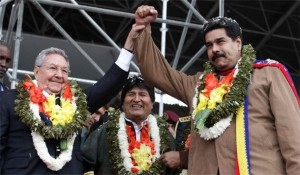◠Congratulations to the Cuban patriots (the Cuban Five), the remaining three of whom were finally released from US jails for the “crime†of making the world a safer place from US imperialism (How extensive and racially and economically selective must a prison system be before we can refer to the installations as concentration camps?) All fair-minded people should rejoice at the moving reunion of these internationalists with their families and their countrymen and women!
Before we are overwhelmed by adulation for President Obama’s role in the release of the remaining Cuban Five, a fawning process that has begun in earnest, we should remind the adulators that it is bad form to praise someone for doing what he or she should have done long before. Nothing has really happened to precipitate a change in US-Cuban relations at this moment except the passing of Obama’s final national election cycle– a fact that suggests that Obama’s welcome moves are more political expediency than any serious change of heart. Those who sense faux-liberal stroking in anticipation of the forthcoming election season are probably on solid ground. The U-turn regarding policy towards Cuba demonstrated recently on the editorial pages of the New York Times also point to a strategic shift in the thinking of key elements of the US ruling class.
â—
John Pilger, by way of Michael Munk’s always interesting blog, l
astmarx, asks what became of Malaysian flight MH17, which crashed in the Eastern Ukraine. After the July disaster, the Western media proceeded to blame Eastern Ukrainian resistance fighters and Russia without a shred of hard evidence beyond “unnamed†Western intelligence “sources†(How do journalists acquire access to intelligence sources yet remain uncompromised?).
Despite recovering black boxes, debris and bodies, the Western investigators have been strangely silent since August. No evidence has come forth apart from Russian sources. No indictments from the notorious International Court of Justice (from which the US refused to honor its jurisdiction in 1986 despite having a permanent judge and frequently imposing jurisdiction on others). Compare this to the Western-induced hysteria surrounding earlier incidents like Korean Airlines 007, a media frenzy that demonized the Soviets for years. Even the crazed General Breedlove– Pilger calls him NATO’s “Dr. Strangelove‖ has remained relatively silent. Could it be that the facts are pointing the wrong way?
â— The 2014 Brazen Hypocrisy award goes to President Barack Obama for his two-faced appeal to the right of self defense. Esteemed Cuban blogger
Manuel A. Yepe lauds research by Brandon Turbeville that recovers a statement from November 2012 by the self-righteous Peace Prize Winner. President Obama, in defense of Israeli aggression, argued: “… there is no country on Earth that would tolerate missiles raining down on its citizens from outside its borders.†Of course this is unabashed hypocrisy for a leader who daily signs off on drone, cruise missile, and bomb attacks on Iraq, Syria, Pakistan, Somalia, or Yemen, a glaring contradiction that Yepe credits Turbeville for exposing.
Certainly there are plenty of candidates for the Hypocrisy Award, most of whom nest in US seats of power: the recent sanctions imposed by a serial human rights violator (the US) against Venezuela for imaginary “human rights†violations count as first degree hypocrisy. Imagine a government that spies on ALL of its citizens, tortures foreigners, and allows militarized police forces to kill unarmed citizens punishing Venezuela and lecturing the rest of the world about good behavior.
Or consider the hypocrisy of ferreting out other countries deficient in democracy– a favorite activity of US media pundits– while never mentioning Japan, a country ruled by one party, the Liberal Democratic Party, since 1955 with less than four years of respite. Many of those dubbed “dictators†would be jealous.
And then there’s the shameless Henry Blodget, the blue-blood, consummate Wall Street insider, who has been banned for life from the securities industry for fraud. Addicted to the celebrity spotlight, Blodget regarded the claim that the Democratic Peoples Republic of Korea hacked a US entertainment company as a sufficient basis for declaring the alleged hack “effectively an act of war….†Blodget’s panic arises from his concerns that the DPRK might “get into the moneyâ€: “’It’s not just they get some credit card numbers which we’ve been seeing forever. But they actually get into the money’ at large corporations and banks†(Yahoo Finance, 12-19-14).
Truly, we swim in a sea of hypocrisy.
◠But hypocrisy is only tolerated because we refuse to hold public figures and the media accountable for their statements; as Gore Vidal put it, we reside in the “United States of Amnesia.†He drew attention to an adult population narcotized by shallow entertainments and denied any sense of history or continuity. Actually, Martha Gellhorn said it much earlier (1953) when she noted the “consensual amnesia†rampant in the US.
It is wrong, however, to blame the US people for the cowardice and lack of accountability of the media and academia. We cannot blame collective ignorance on the victims when it is the product of the massive, suffocating machinery of capitalist disinformation and vulgar culture.
Imagine if we could hold all of the opinion makers and policy pundits accountable for their slavish promotion of the unprovoked invasion of Iraq and the subsequent destabilization of the entire Middle East. Imagine if we could exile them to write for the Metropolis Daily Planet until they reclaimed their integrity. Soon, we would forget the names Friedman, Krauthammer, and the other cheerleaders of imperialism, maybe even the loudmouth, Cheney. Exactly what journalistic crimes must they commit, what disasters must they endorse before their bosses and colleagues turn them out?
Similarly, the economic collapse of 2007-2008, unpredicted and unsolved by the “wise men†of the economics profession, has spawned no new thinking or rejection of the old.
Sadly, most of our public intellectuals have become courtiers and not truth seekers.
â— We must not ignore the amnesia of the US left. Forgotten is the mass euphoria over the election of Barack Obama in 2008. Virtually all of the liberal and soft left was swept away by the overwhelming Democratic Party victory, affording a two-year window to pass a whole laundry list of legislation benefiting labor, minorities, women, the elderly, undocumented and other components of the Democratic Party coalition. Except for a health care initiative that has failed to live up to anyone’s expectations other than insurance companies, none of these promises came to fruition, even to serious consideration. As the Democrats gin up for another Presidential campaign behind Hillary (after she disposes of the Quixote-like campaign of Elizabeth Warren), this miserable performance will be forgotten. With the Obama well running dry, liberal and the moderate left will drill a new Clinton well of hope. Memories are short.
â— While the signs of mass militancy are positive, most recently from the anger and activism springing from criminal police behavior, the left seems to find diversions and distractions that create speed bumps, if not detours, from clarity and united action.
The energy of the Occupy movement was welcome, but the embrace of the organizing principles of disorganization proved– once again– a damper on movement building. Seemingly, every generation must champion group therapy as an antidote to “hierarchies†and “leadership,†alleged features of the “old left,†“the establishment,†“elites†or other evils imagined by self-anointed ideological gurus.
The New Left of the sixties pioneered this posture, shattering enormous mass movements against racism and war into a thousand pieces. The shallow and idealistic emotions conjured by the words “participatory democracy†arise again and again with the same result.
◠The latest obstacle to ideological clarity and effective action is the amorphous and ideologically confounding “Sharing†Economy movement. The “New†or “Sharing†economy projects occupy two distinct poles.
At one pole are the liberal/left activists who have been shocked by the human carnage of economic crisis, but are afraid of or disillusioned with the socialist option. While many may see capitalism’s flaws, they are cowed by the enormous task of defeating and replacing it. Rather than joining Marxists, who are confident and determined to revive the fight for a world without exploitation and without rule by the rich and powerful, they propose that we simply drop out of the global economy, that we live and work outside of it. In collectively owned cooperatives, they propose an alternative to capitalism. But is it really an alternative?
Certainly there is nothing, in principle, wrong with cooperatives. Indeed, they are sometimes an answer for small-holders to improve their destiny against large capitalist enterprises. That is, they can postpone, but rarely derail the laws of capitalist development, the tendency for the large to devour the small.
But it is silly to believe that cooperatives in any way challenge capitalism as we know it today. State-monopoly capitalism– the merger of the power of the state with the largest, most economically dominant corporations– will not shudder in the face of the cooperative movement. Nor should it. If cooperatives posed any kind of threat, the mega-corporations would swat them like flies.
Instead, the New Economy (cooperative) movement does offer an alternative– an alternative to small businesses. Cooperatives, where they exist, compete against small businesses. They mesh a small-business mentality with an immature social consciousness, a program that only succeeds at the expense of those businesses marginally able to survive while leaving the rich and powerful untouched.
At best, the cooperative movement offers a safe haven for the few to hone their entrepreneurial skills in commercial combat against some of our potential allies in the anti-monopoly movement, the under-capitalized, marginal small business owner.
â— The other pole, however, is more insidious. The “sharing†economy, as exemplified by Uber and other creatively named Google-era projects, does not pretend to be anti-capitalist. While “sharing†poses as a kinder, gentler, freer capitalism, it really counts as a way for a new generation of entrepreneurs to pry open markets long dominated by well ensconced services. At the same time, this well-educated, supremely self-confident cabal have seduced many into believing that predation on these service industries is somehow “progressive.â€
In fact, Uber and the sharing model are a step back to proto-capitalism, a return to the putting-out”system, where providing the labor and resources is the responsibility of others and not the capitalist. Uber, for example, uses the human capital (drivers) and fixed capital (their cars) of its “employees†to undermine services that are capital intensive (taxis, insurance, benefits, maintenance, fuel, etc) and available to even the most disadvantaged (subsidized public transportation). Like charter schools and package-delivery services, they cherry-pick the most profitable, least risky, or least costly niches of a service and leave the rest for someone else (most often, the public sector). In that way, they most resemble the hyper-exploitative cottage industries of the pre-industrial era. Like those industries, they rely upon sweated labor and forgo all worker protections.
Of course not all those embracing the sharing model begin as predators. Many see the internet as creating new opportunities for matching people and services. But centuries of capitalism teach us that every entrepreneur afforded the opportunity of matching people with services has leaped at the opportunity to commercialize it. Elite universities and business schools have not purged that tendency from their students.
Whether it is cooperatives or the “sharing†model of entrepreneurship, those looking for answers to the rapaciousness and vulgarity of our society must look elsewhere.
We will come no closer to achieving social justice and democracy until we understand the malignancy of capitalism. There are no other diagnoses.
Zoltan Zigedy













